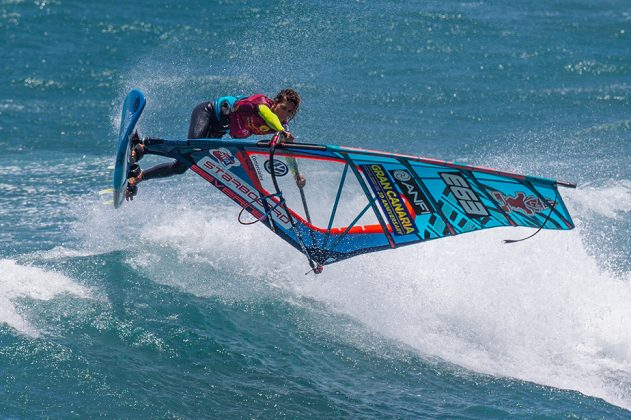The jury is still out on whether good windsurfers are born or made.
It’s the role of science to keep disproving itself; which is at the same time healthy … and a bit annoying for those after some solid advice, especially concerning diet and fitness where experts seem to contradict each other on a daily basis. It’s clearly personal and multifactorial. Still, it keeps us on our toes … and the scientists in business. The other debate that rages on in the sports world is whether elite performers are born or made – and even if there is such a notion as innate talent.
A decade ago in his book ‘Outliers’, Malcom Gladwell popularised the 10,000 hour rule, the amount of practice (effectively 3 hours a day for 10 years) needed to become a master of your art, be it music, business, sport et al. The research was taken from Anders Ericsson’s work with the Berlin school of music, where he noted that the only difference between the elite and the also-rans, was the amount they worked at it. As for natural ability, he said simply that you had to be good enough – but didn’t recognise the concept of innate talent or prodigies who rose effortlessly to the top:
“I can’t say categorically that prodigies don’t exist, but I can say that I’ve been searching for such evidence over 30 years and I’ve yet to find a case that doesn’t allow for an alternative explanation.” He goes on to say that even the incredible mathematic and memorisation skills of autistic savants (e.g. ‘Rain man’) can be replicated by non-autistic people if they devote the same amount of time to the task.
A few years ago when I shared the 10,000 hour theory in these very pages, there was a collective groan from the amateur windy community, which basically said “we’re screwed – last year I only managed 20 hours, and the year before that 10, I’ll need to live to a 100 to get anywhere near it.”
Well since then, very happily, the 10,000 hour rule has been robustly challenged. It’s catchy and quotable – but Ericsson himself said Gladwell took it out of context and way over-simplified it.
It was clear even to the common man that just doing an activity for 10,000 hours doesn’t make you any good at it, otherwise every London cabbie would be a brilliant driver and I would be able to type 200 words a minute. It’s all about how you approach your chosen activity. The keywords on the scientists lips are ‘deliberate practice.’ Ericsson again:
“This distinction between deliberate practice aimed at a particular goal and generic practice is crucial because not every type of practice leads to improved ability. You don’t get benefits from mechanical repetition, but by adjusting your execution over and over to get closer to your goal.”
It’s here that improving windsurfers needs to prick up their ears. Take tennis or golf, both skill sports. Very quickly the dubious thrill of smacking a ball becomes secondary to the desire to get better at it. It’s all about doing drills and improving. But for us, because the activity itself is (mostly) so exhilarating and enriching, we don’t need to improve to have a good time – but we’d still like to. Example. I did a course at Portland recently. Most had presented themselves because they were aware of their technical flaws, mostly dodgy gybes and really wanted to work on them. I gave my little spiel about how a day like this is perfect for shedding ego, hurling themselves out of their comfort zone, taking up wilder angles and trying something different. All agreed.
So with gybes on the agenda I told them to limit their reaches to 200m maximum, gybe, return, repeat, so we can put a load in and get a rhythm going. Off they went and to a man, kept going until they ran aground at the far end of the bay 1.5 miles away. When they came back I asked gently what was with the speed runs. And all of them grinning ear to ear chorused: “It was so much fun!” Point proven m’lud.
Fun it may have been; however, to improve, you do have to spend chunks of time fiercely concentrating on a certain aspect of your game, preferably with instant feedback from an expert. And happily it doesn’t have to be for 10,000 hours.
Innate talent
I was having tea with a friend outside our hired unit on the shores of Camp 1 in Maui, and out on the water was a very youthful Ricardo Campello busting out an early freestyle routine. “That boy was born to windsurf” my friend said. For the past couple of months I’d seen Ricardo crash and burn 1000 times in search of this ‘natural’ performance. The beauty and polish of the finished article so often hides a huge body of work. Is anyone really born to windsurf?
Despite the touchy-feely claims of some therapists that we can all excel in our chosen field, it’s clear that some are genetically pre-disposed to shine in certain areas. I mean, no matter hard you practice and how much you want it 5’4” Kevin Wilkinson, you are never going to run faster than 6’5” Usain Bolt with his 9 foot stride and hectares of super fast twitch muscle.
But in skill based sports, what seems like ‘natural ability’ often isn’t.
A husband and wife team joined me in Mauritius a few years back. They were both fit and agile and had taken up the sport together. However, the husband lamented how much quicker his wife ‘got it’, how she just seemed to feel it without being told and how gracefully she moved around the board. It was true. She did look like she’d been doing it all her life.
However, as we got to know each other, she revealed that in a past life she had been a professional dancer. Well that’s cheating. I was at a Samba night in Brazil last week – and looking at the couples move and sway, it was windsurfing – moving as if on wheels, with minimal weight transfer, leading with the head, moving the partner gently out of the way on extended arms and then stepping into the space. Professional dancer – what a HUGE advantage! Poor hubby never stood a chance. She had basically been windsurfing since she was 8.
So much behaviour we see as natural, has actually been learned – with vigour. When talking about the autistic savant’s extraordinary memorising abilities, Anders Ericsson also said: “they’re more likely to practice obsessively.”
In the end, it’s all about passion. You’re never going to practice hard at something you don’t really really enjoy.
A little talent + a lot of work = excellence.
Peter Hart – 25th Jan 2019
Iballa Moreno in full flow – innate talent or loads of hard work? PHOTO John Carter



